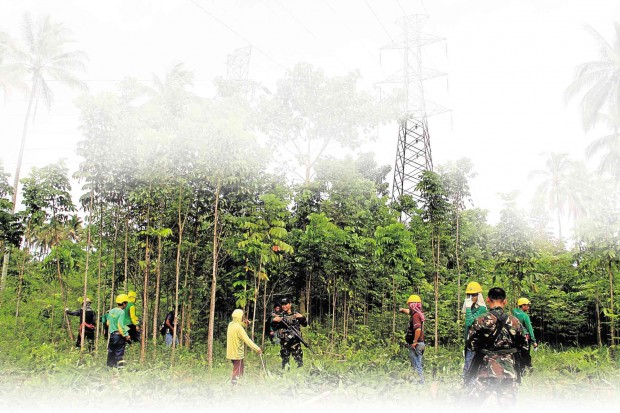Private guards eyed for power towers

WORKERS of the National Grid Corp. of the Philippines conduct clearing operations with military escorts on a parcel of land in Balo-i, Lanao del Norte province, where transmission towers and lines are located. RICHEL V. UMEL/INQUIRER MINDANAO
CAGAYAN DE ORO CITY—A consensus is taking shape to deploy private security groups to protect transmission towers in Mindanao against attacks that lead to power supply interruption in areas already facing a shortage in electricity.
The proposal to send private armed contractors to guard power transmission sites and other facilities of the National Grid Corp. of the Philippines (NGCP) was made during a meeting held here by the House energy committee on the series of bombings that had toppled NGCP towers and disrupted power supply in many areas.
NGCP, which maintains the towers and other facilities that bring electricity from power plants to distributors, said it is studying the proposal.
Cagayan de Oro Rep. Rufus Rodriguez, energy committee cochair, brought up the possibility of sending private armed contractors to guard power facilities, especially in areas where transmission towers had been targeted in previous bombings or are facing attacks.
Maj. Gen. Demy Tejares, deputy commander of the Army’s 1st Infantry Division, said the idea is welcome, admitting that the military could not possibly guard all NGCP towers in Mindanao.
Cynthia Alabanza, NGCP spokesperson, said the NGCP is open to the idea. She said this is not the first time that the NGCP considered hiring private armed contractors to guard power facilities.
Alabanza, however, said the NGCP is taking a long, close look at the proposal, “making sure that everything is above board and everything is with legal basis.”
At the meeting held by the House energy committee, a group of consumers in Mindanao raised the need for legislation to impose tougher penalties for attacks on power facilities which should be considered as acts of economic sabotage.
One of the recommendations put forward by the group Mindanao Coalition of Power Consumers is a prohibition on the planting of trees or construction projects near existing power transmission and distribution lines.
The group also urged the military to take the lead in protecting transmission lines, especially in areas the police could not secure.
The NGCP has reported that in 2015 alone, 14 transmission towers had been bombed.
The attacks took place in Lanao del Norte, Lanao del Sur, Maguindanao, Sultan Kudarat, North Cotabato and Marawi City.
This year, two transmission towers in Aleosan, North Cotabato, and in Pantar Dimayon, Bubong, Lanao del Sur, were also bombed although they were not toppled, Alabanza said.
The attacks have brought outages to many parts of Mindanao. Shorter interruptions in the supply of electricity have been caused by trees and vegetation near transmission towers.
Police said they continue to hunt the suspects in the bombings.
Chief Supt. Isagani Nerez, head of the Philippine National Police’s Directorate for Integrated Police Operations in Eastern Mindanao, said four suspects in one of the attacks had been charged. Jigger Jerusalem, Inquirer Mindanao